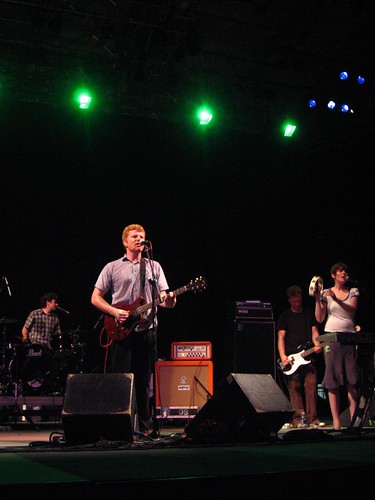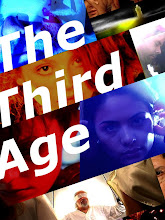I read a smattering of JLA stuff before beginning this whole series readthrough and the one thing I read that I really liked was Rock of Ages. Most of the weaker stories in Grant's JLA run are the ones that are decent superhero stories that just happen to be written by Morrison. The best, like Rock of Ages, are ones where it's a Grant Morrison story that just happens to star the JLA. This was written around the same time as The Invisibles' Hand of Glory arc, in the wake of Morrison's "alien abduction," an experienc that forever changed the direction of his work.
Before the alien abduction, Grant was a great writer, who told some weird stories, but his works didn't have an overarching connecting tissue. It was the abduction experience that gave Morrison the basis for his personal philosophy, the philosophy that informed all his work since. You can see this division quite clearly in The Invisibles, the first few issues explore a lot of things but it's not until the 'Sheman' arc that Morrison's conception of the nature of time becomes clear. As that series develops, his 4-D conception of reality becomes the guiding principle for both the fiction itself and the philosophy that it's trying to bring into reality. Works like The Invisibles and The Filth are a blend of philosophical text and adventure story.
Reading Rock of Ages you can see a lot of the concepts developed in The Invisibles filtered through a different lens, though this series also presents some inconsistencies from the worldview that Morrison forwards in Invis. However, the story doesn't begin with craziness, rather it starts with a pretty basic setup. Lex Luthor has bought the JLA's greatest enemies together to attempt a corporate takeover of the JLA. Despite the appearance of yet another evil version of the Justice League, this is a really nice opener for the arc. It's cool to see Mirror Master return, he was the star of a great single issue story in Morrison's Animal Man. One of the cool things about reading stuff in the DCU is seeing characters from previous runs, it's sort of like seeing an actor you really like pop up unexpectedly in another film. It may not have the same magic as the original appearance, but there's a nice spark of recognition nonetheless.
One of the things you get reading the whole JLA series rather than random excerpts is a better sense of the character development. A lot of the characters here are inert, Superman isn't going to go through a soul wrenching journey of personal discovery. However, we do get to see the younger heroes change. Kyle, despite his vast powers, has to deal with personal unease about his role in the Justice League. One of the scenes that best shows this is the moment where he's arguing with a random guy on the street, insisting that the JLA's just doing their best.
About halfway through the arc, things take a major turn with the appearance of Metron. I first encountered Metron in Seven Soldiers: Mister Miracle, a series that caused me much confusion. However, after reading the TPB of New Gods, I was totally prepared for the excursion into Kirby mythology. Metron is the DC Universe equivalent of John a Dreams, a guy who's able to move through space and time at will, however, Metron chooses to remain in his own form rather than subsume himself to another persona.
Metron sends Green Lantern and Aquaman on a mission to retrieve the Philosopher's Stone from a future reality and they bounce into reality known as Wonder World. While on Wonderworld, Green Lantern comes across the infant universe of Qwewq! This is one of those details that's just mindblowing, the infant universe of Qwewq somehow makes it off Wonderworld and later turns up in Morrison's JLA: Classified arc. Qwewq is infested with the black death, but also given a vaccine in the form of the ultramarines, and it eventually grows up to become Neh-buh-loh from Seven Soldiers. Just think about the journey of this infant universe from this issue to the end of Seven Soldiers. No one else is doing this kind of crazy storytelling, chronicling the growth of an entire universe in the background of a bunch of books. The series of events that will ultimately hold back the Sheeda invasion begins here in Rock of Ages.
After Wonderworld, Green Lantern meets up with Hourman. At the end of this book, Metron gives the philosopher's stone to Hourman, and asks him to keep it safe. However, this event actually takes place before Kyle meets with Hourman. So, Hourman is able to show Kyle the stone, and caution him about Metron's betrayal, because the good Metron travelled to Hourman and gave him the stone. Metron's speeches are all about asking people to transcend 3-dimensional logic and perceive all of time as one flowing entity. To understand the story, you also have to accept that logic because it's the only way you're able to understand why Hourman has the stone earlier in the story, but isn't given it until the end.
One of the best things about this arc is just how dense it is. Morrison's throwing out single issues that other writers would have spend twelve issues on, he's just got that much material. The Wonderworld segment leads into a post apocalyptic drama set in a world that Darkseid has conquered. After turning themselves into pure light information, Flash, Aquaman and Green Lantern turn up in this bad future and have to fix it. Sure, it's a little Days of Future Past, but the fact that this massive universe appears for a single issue adventure means you don't have time to dwell on the cliches.
The way that this arc resolves itself relies on a different conception of time than what Morrison uses in The Invisibles. In The Invisibles, it's impossible for there to be an alternate universe because all time exists simultaneously. If you went back in time five years, the changes you made would already be in place because you exist in a universe where you were five years ago. Figuring out this conception of time took me a long time, but I eventually got it by tracing Ragged Robin's journey. In 1996, the younger version of herself sees the older version of herself on the mesa. There was never a universe where the younger Robin saw no one, older Robin was always there, which means that the future she created through her time travel was the one she grew up in. That's why Jack tells her not to worry when she launches, she's already done everything right.
However, here in Rock of Ages, Metron posits a reality in which the forces of good and the forces of evil duel over the direction of reality and the outcome of each battle shapes the development of our world. One could argue that these Gods are essentially serving the same role as 5-D beings like John a Dreams did in The Invisibles. However, if that's true, then where did the evil Metron come from? If the alternate universe did exist, then it's logical that evil alternate future Metron could trick the JLA, however, if you're using the Invis concept of time, that alternate future would be impossible and the evil Metron could never exist.
To reconcile this, we need to turn to Morrison's idea of hypertime. This is the idea that time is like a river, there's the main river, but also a bunch of smaller bodies of water that branch off from the main flow. Sometimes these smaller rivers just stop, other times they'll connect back to the main river. So, according to this, the reality where Darkseid rules the world would be a small branch off the main river, one that eventually reconnects with the main flow.
Metron talks about the Philosopher's Stone as the Worlogog, an incarnation of all space/time. If we're to believe that the stone is a model of the universe, it would be logical that destruction of that model would lead to a new, incorrect universe. So, by saving the stone, they're quite literally saving the universe and ensuring that time proceeds down a good path. The stone, both visually and conceptually, is exactly like the magic mirror that the Invisibles crew encounters in New Mexico. The idea of a liquid that contains in it all moments of spacetime is one of those things I always struggle to get my head around. In this liquid we see all our experiences modeled, all of reality contained in this one object.
The idea that reality could be modeled in a fixed liquid is in line with Morrison's conception of our universe as a massive life chain flowing down from the first organism on the planet to present humanity. Travelling through this organism, freed of our individuality, we could experience reality through anyone's perception at any time.
The end of this arc has a lot of interesting foreshadowing. Metron indicates that the JLA themselves will be the New Gods, the key figures in the next fight for humanity's future. The idea that the JLA become gods is the critical founding component of Morrison's run. He is elevating them to the status of myth, and building towards a fnal battle on a mythic scale.
This is an arc that's just so nuts you have to love it. This is the first arc that feels uniquely Morrison and it's a great companion piece to the stuff going on in The Invisibles at the same time. I think comics can be proud that their biggest franchise isn't just telling the same story over and over again, this book is exploring intellectual territory that very few stories ever touch.





